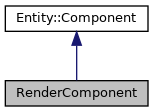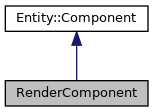A component that stores the information required to render the entity on the screen. More...
#include <Components.hpp>
Inheritance diagram for RenderComponent:

Collaboration diagram for RenderComponent:

Public Member Functions | |
| RenderComponent () | |
| Construct a new RenderComponent. More... | |
 Public Member Functions inherited from Entity::Component Public Member Functions inherited from Entity::Component | |
| Component (const std::string id) | |
| Construct a new Component object. More... | |
| virtual | ~Component () |
| This is only declared to make the class polymorphic so that dymaic_cast between Component types works. | |
| const std::string | getId () const |
| Get the ID of the component. This will return the same value for all instances of a class of Component. | |
Public Attributes | |
| std::shared_ptr< sf::Texture > | texture |
| The texture that the sprite uses. More... | |
| sf::Sprite | sprite |
| The sprite that will be rendered to represent the entity. | |
Static Public Attributes | |
| static const std::string | RENDER_COMP_ID |
| The ID of RenderComponent. | |
Detailed Description
A component that stores the information required to render the entity on the screen.
Constructor & Destructor Documentation
◆ RenderComponent()
| RenderComponent::RenderComponent | ( | ) |
Construct a new RenderComponent.
Construct a new RenderComponent with unitialized variables. After creating a RenderComponent this way, you should load the texture (such as with texture.loadFromFile() ) and then set the sprite to a new sprite based on that texture.
Member Data Documentation
◆ texture
| std::shared_ptr<sf::Texture> RenderComponent::texture |
The texture that the sprite uses.
The sprite does not use a pointer that keeps ownership of the texture, so we do so here to ensure it doesn't go out of scope.
The documentation for this class was generated from the following file:
- /home/nathan/Code/SimpleCppGame/include/entity/Components.hpp